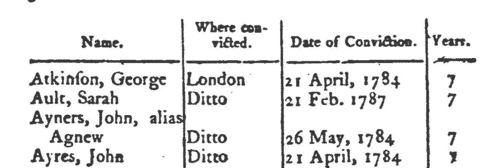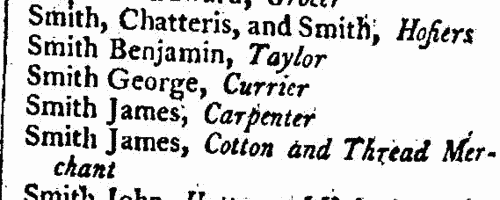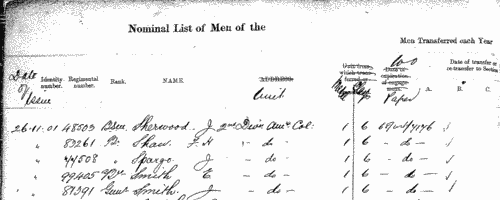Bails Surname Ancestry ResultsOur indexes 1000-1999 include entries for the spelling 'bails'. In the period you have requested, we have the following 7 records (displaying 1 to 7): Buy all | | | Get all 7 records to view, to save and print for £44.00 |
These sample scans are from the original record. You will get scans of the full pages or articles where the surname you searched for has been found. Your web browser may prevent the sample windows from opening; in this case please change your browser settings to allow pop-up windows from this site. Royalist delinquents in county Durham and Northumberland, their successors, tenants, debtors and creditors
(1648-1660)
King Charles I was executed 30 January 1649, the kingship was abolished and government by a Council of State was established 14 February 1649. Oliver Cromwell became Lord Protector 16 December 1653; died 3 September 1658; and was succeeded by his son Richard, who abdicated 24 May 1659. Charles II was established on the throne 29 May 1660. From 1648 to 1660 parliament sequestrated royalists' estates, restoring many by a process of heavy fines called compounding; this was administered by the Committee for Compounding, working through county committees. These raised considerable amounts of money, money which was vitally necessary for maintaining the parliamentary army's campaigns to subdue opposition in the three kingdoms - England, Scotland and Ireland. The raising and delivery of these monies was the responsibility of the Committee for Advance of Money (C. A. M.). The records of these committees were detailed and extensive, amounting to about 300 volumes, and were calendared for the Public Record Office by Mary Anne Everett Green. Abstracts of the county Durham and Northumberland entries were collated by Richard Welford with a manuscript transcript of the proceedings of the parliamentary commissioners in county Durham surviving in Durham cathedral library, and published by the Surtees Society in 1905. The persons named in these abstracts are not only the delinquents themselves, and those who succeeded them in their estates, but tenants, debtors and creditors, and local constables and officials of the committees.BAILS. Cost: £4.00.  | Sample scan, click to enlarge

|  Masters of clerks and apprentices
(1774) Masters of clerks and apprentices
(1774)
Apprenticeship indentures and clerks' articles were subject to a 6d or 12d per pound stamp duty: the registers of the payments usually give the master's trade, address, and occupation, and the apprentice's name, as well as details of the date and length of the apprenticeship. 1 January to 31 December 1774.BAILS. Cost: £8.00.  | Sample scan, click to enlarge

| Convicts sent to New South Wales
(1787)
'The Voyage of Governor Phillip to Botany Bay, with a Account of the Establishment of the Colonies of Port Jackson and Norfolk Island: compiled from Authentic Papers' included as an appendix this list of convicts sent to New South Wales in 1787: giving full name (surname first), where convicted, date of conviction, and length of sentence.BAILS. Cost: £4.00.  | Sample scan, click to enlarge

| Inhabitants of Sunderland in county Durham
(1790-1797)
The provincial sections of the Universal British Directory include lists of gentry and traders from each town and the surrounding countryside, with names of local surgeons, lawyers, postmasters, carriers, &c. (the sample scan here is from the section for Nottingham). The directory started publication in 1791, but was not completed for some years, and the provincial lists, sent in by local agents, can date back as early as 1790 and as late as 1797.
BAILS. Cost: £6.00.  | Sample scan, click to enlarge

| British in India and Ceylon, China and Australasia
(1836)
Births, marriages and deaths, civil, ecclesiastical and military promotions, furloughs, reports of shipping to and from England and the East, with passenger lists, and news items published in the Asiatic Journal
BAILS. Cost: £6.00.  | Sample scan, click to enlarge

|  British merchant seamen
(1835-1840) British merchant seamen
(1835-1840)
At this period, the foreign trade of ships plying to and from the British isles involved about 150,000 men on 15,000 ships; and the coasting trade about a quarter as many more. A large proportion of the seamen on these ships were British subjects, and so liable to be pressed for service in the Royal Navy; but there was no general register by which to identify them, so in 1835 parliament passed a Merchant Seamen's Registration Bill. Under this act a large register of British seamen was compiled, based on ships' crew lists gathered in British and Irish ports, and passed up to the registry in London. A parliamentary committee decided that the system devised did not answer the original problem, and the original register was abandoned after less than two years: the system was then restarted in this form, with a systematic attempt to attribute the seamen's (ticket) numbers, and to record successive voyages. The register records the number assigned to each man; his name; age; birthplace; quality (S = seaman, &c.); and the name and official number of his ship, with the date of the crew list (usually at the end of a voyage). Most of the men recorded were born in the British Isles, but not all. The system was still very cumbersome, because the names were amassed merely under the first two letters of surname; an attempt was made to separate out namesakes by giving the first instance of a name (a), the second (b), and so on. This section of the register (BT 112/2) covers numbers 1 to 2952 and 20200 to 23034, 5786 different entries, of men whose surnames began with the letters Ba. During 1840 this series of ledgers was abandoned, and a new set started with names grouped together by surname.BAILS. Cost: £8.00.  | Sample scan, click to enlarge

|  British artillerymen fighting in South Africa
(1899-1902) British artillerymen fighting in South Africa
(1899-1902)
The Queen Victoria's South Africa Medal was awarded (after her death, in the event) to all who had served honourably in the various campaigns in the Boer War. Returns were made from each unit, and consolidated into nominal roll, of which this is the one for the Royal Artillery. Confusingly, the ledgers used had originally been printed for a register of men transferred (or re-transferred after mobilization) to 1st Class Army Reserve. All the original column headings were therefore struck through, and the roll was prepared with this information: Date of Issue; Regimental Number; Rank; Name; Unit; Medal (a 1 indicating that a medal was awarded); [number of] Clasps; the reference to the source in the original returns, usually starting with AG for papers in the hands of the Adjutant-General, and 68/Art/ for the Royal Artillery records. The final column, normally left blank, was occasionally used for explanatory remarks.BAILS. Cost: £8.00.  | Sample scan, click to enlarge

|
Research your ancestry, family history, genealogy and one-name study by direct access to original records and archives indexed by surname.
|










